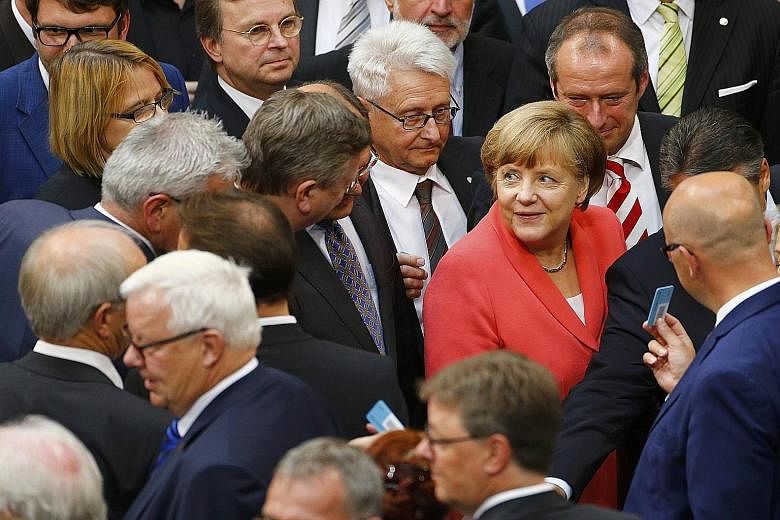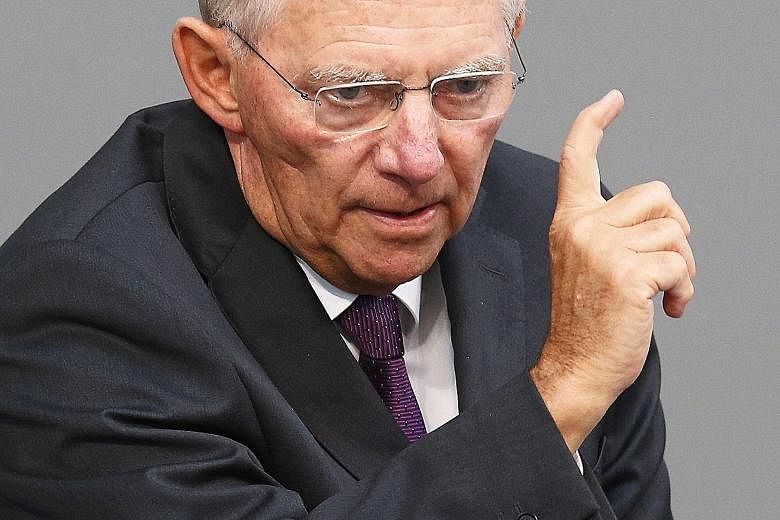BERLIN • German lawmakers yesterday gave their go-ahead for the euro zone to negotiate a third bailout for Greece, heeding a warning from Chancellor Angela Merkel that the alternative to a deal with Athens was chaos.
The Bundestag lower house of Parliament, whose backing is essential for the talks to start, decisively approved the move by 439 votes to 119, with 40 abstentions.
Popular misgivings run deep in Germany - the euro zone country which has already contributed most to Greece's two bailouts since 2010 - about funnelling yet more aid to Athens.
Finance Minister Wolfgang Schaeuble has questioned whether a new programme will succeed, although the creditors' offer to Athens includes the conditions for more austerity and economic reform that Berlin had demanded.
But Dr Merkel argued for negotiating a new deal to prevent a Greek exit from the euro - the "Grexit" that might undermine the entire currency union - and said suggestions that Athens might temporarily leave the euro would not work.
"The alternative to this agreement would not be a 'time-out' from the euro... but rather predictable chaos," she told the Bundestag.
"We would be grossly negligent, and act irresponsibly, if we didn't at least attempt this way."
Mr Schaeuble himself has suggested that Greece might be better off taking such a time-out from the euro zone to sort out its daunting economic problems.
But the conservative chancellor said neither Greece nor the other 18 euro zone member countries were willing to accept the idea. "Therefore, this way was not viable," she added.
Despite his misgivings, Mr Schaeuble lined up with his boss. "I ask you all to vote for this request today. The government didn't submit the request easily," he told the Bundestag. "It's a last attempt to fulfil this extraordinarily difficult task."
Dr Merkel also won support from the Social Democrats, the junior coalition partner.
That view is far from unanimous across the nation. "Seven reasons why the Bundestag should vote 'No' today," ran a headline in the mass-selling Bild daily before the debate, listing "Grexit is the better solution" and "our grandchildren will pay" among its reasons.
That could well be true. International Monetary Fund (IMF) chief Christine Lagarde yesterday stressed the importance of easing Greece's debt burden for her institution to participate in the European rescue package for Athens.
Speaking on French radio, Ms Lagarde was asked whether the rescue plan for Greece was viable without restructuring Athens' enormous debt load. "The answer is fairly categoric: 'no'," she insisted.
The Greek Parliament approved the new bailout offer in the early hours of Thursday, although Prime Minister Alexis Tsipras had to rely on opposition support after some lawmakers from his left-wing Syriza party rebelled.
Mr Tsipras moved yesterday to replace his energy minister, one of the rebels, a source said. Some Syriza members refused to accept the demands for yet more austerity and reform included in the deal with Greece's creditors. The Greek electorate had already rejected an earlier offer in a referendum, and the latest is even tougher.
Still, the Greek parliamentary approval opened the way for European action to stave off Grexit, at least for the time being. The European Central Bank (ECB) increased emergency funding to keep the country's banks from collapse on Thursday. European Union finance ministers also approved €7 billion (S$10.4 billion) in bridge loans to Greece, allowing it to avoid defaulting on a bond payment to the ECB next Monday and clear its arrears with the IMF.
With Dr Merkel under domestic pressure from lawmakers who have lost their trust in Greece, the creditors agreed on a tough deal at the weekend, demanding that Athens cut pensions, raise value-added tax, and set aside €50 billion of state assets to sell off.
REUTERS, AGENCE FRANCE-PRESSE


